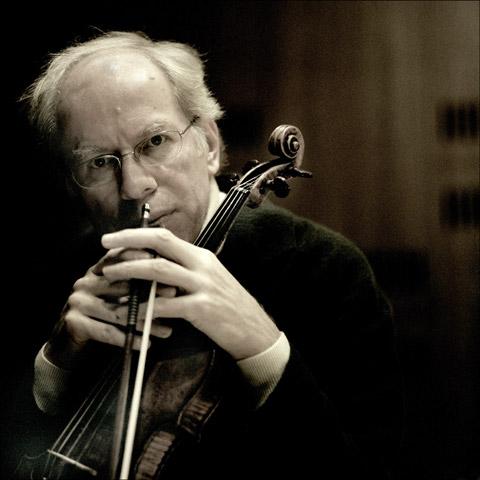
KREMER VS. KREMER Due to play Symphony Hall at the end of this month, Gidon Kremer performed at Longy’s more intimate Pickman Hall.
|
For a moment, it seemed as if the Boston Symphony Orchestra was back in its full ripeness. After the disappointment of the season-opener, with Anne-Sophie Mutter playing and conducting Mozart violin concertos with a small orchestra of strings and four winds, it was thrilling to hear the whole ensemble in the first few bars of Benjamin Britten's FourSeaInterludes from his opera Peter Grimes, particularly the strong but musical brasses. It was led by the BSO's 30-year-old assistant conductor Sean Newhouse, who last season was in the unenviable position of having to conduct Mahler's monumental Ninth Symphony with almost no rehearsal when maestro James Levine had to cancel at the last minute. A couple of young conductors (Michael Tilson Thomas, Kent Nagano) became overnight stars rising to that identical challenge, but Newhouse distinguished himself mainly by just getting through it.This time, he had plenty of rehearsal time, but little that followed those opening bars was especially compelling. Those roiling Sea Interludes are external expressions of inner passions, or of the spirit of an entire community (Britten must surely have heard George Gershwin's hurricane music in Porgy and Bess). But what we got ignored those powerful undercurrents. The program ended with another long-neglected piece that was once a staple of the BSO repertoire, Sibelius's large-scale Symphony No. 2 (which Serge Koussevitzky evidently led more than 100 times!). But the same absence of large vision that inhibited Newhouse's Mahler was also apparent in the Sibelius, which lacked mystery, the sense of each episode leading to something maybe even stranger and less predictable. Movements didn't conclude; they just stopped. And the playing, at least at the first performance, lacked crispness of articulation, maybe partly because Newhouse had abandoned Levine's seating plan in which the first and second violins are on opposite sides of the stage, not all in one clump. Enchanting little rhythmic figurations sounded vague and blurry. So the entire symphony seemed a little dull.
Newhouse conducts with broad gestures — maybe too broad. I thought of a student in a college play acting the part of a conductor. I'm being tough on him, but the BSO has had some impressive assistant conductors (one former AC, Ludovic Morlot, is returning later this season as a full-fledged guest conductor), and though excuses could be made for the disappointing Mahler, that was no longer the case.
The most successful part of the evening came in the middle, with the marvelous French pianist Jean-Efflam Bavouzet playing the scintillating and tuneful Prokofiev Third Piano Concerto. Prokofiev was another Koussevitzky specialty, but this concerto is still very much in the repertory. Bavouzet first came to my attention in London a few years ago playing Janácek's wicked Capriccio for Piano (left hand) under Pierre Boulez, with whom he's frequently collaborated. He shared Boulez's tensile sweetness, delicate sense of line, and phenomenal ear. These were all in evidence in this Prokofiev, and Newhouse maintained a lively pace.